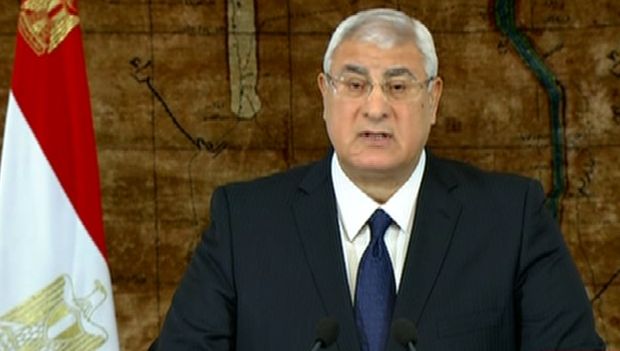There is a colloquial Egyptian expression that describes someone shouldering a heavy responsibility: they are said to “carry the night.” This accurately describes interim Egyptian President Adly Mansour, who will have completed almost a year in the country’s top executive post when he hands power to the elected president following the presidential elections due to take place in May.
Mansour assumed his responsibilities on July 4, 2013, following the popular uprising on June 30 that led to the overthrow of the Muslim Brotherhood and its president, Mohamed Mursi. There was great responsibility to be borne during that difficult period—a weight so heavy many would have shirked the task to avoid paying the price of taking tough decisions. Following the uprising, violent confrontations erupted in the streets, and both public pressure and public expectations were high. And, having already gone through one revolution on January 25, 2011, Egypt’s government and state institutions were already teetering on the brink of collapse.
Of course, Mansour was not alone. There was the first government formed after Mansour was sworn in as the president. In turn, that government shouldered tough responsibilities in critical circumstances. Other figures also played a significant role in the transition period and in setting the roadmap, from drafting a constitution to preparing for the presidential and parliamentary elections that have yet to take place. It is also true that the military was the de facto guarantor of stability and the backbone of the government during that tough period. But it would have been impossible to get through that phase without a president. It was Mansour who was at the helm.
Mansour was a member of the judiciary—more specifically the Supreme Court, which came under pressure during Mursi’s rule. It was besieged several times—a repellent scene. Not all Egyptians had heard of Mansour before he took office, given that he was neither a politician nor a public figure known outside judicial and legal circles. But Mansour was the right choice to lead Egypt’s transition period, given that under the constitution at the time the head of the Supreme Court was third in the line of power, after the president and the speaker of parliament. We must remember that at the time, there was neither a president nor a parliament.
Within a few months, Mansour had gained the respect of many Egyptians through both his performance and his brief and eloquent speeches. He went before the public, seeking to restore their faith in the prestige and wisdom of the president as a representative of the country following the Brotherhood’s farcical performance. Mursi’s term in office had been overshadowed by questions about who held the reins of power in Egypt: the president or the power behind him, the Brotherhood’s guidance bureau. Beyond that concern, there was the general dissatisfaction with the Brotherhood’s discriminatory and exclusivist approach, which provoked public criticism and anger.
Mansour’s task was no easy one, given that society had been on edge for so long and had become extremely polarized. The Brotherhood chose violence in an attempt to impose its will on the Egyptian people. As a result, President Mansour had to perform a difficult balancing act, quelling the violence and passing through a tough transition period while also assuring the public that their demands for change would be met.
The transition period has yet to end, but we are in the last stretch now that the presidential election campaign is underway. Still, it can be said that the most difficult stage has ended. For this, we must acknowledge the immense responsibility Mansour has borne, all the while knowing he had to carry the burden of being the captain of a ship heading into strong winds without even being able to harbor ambitions for a second term.
